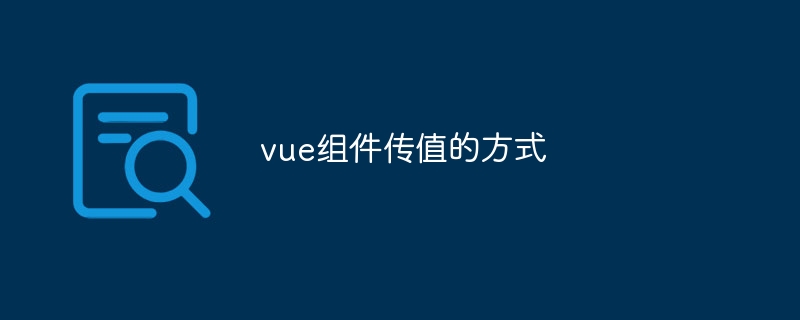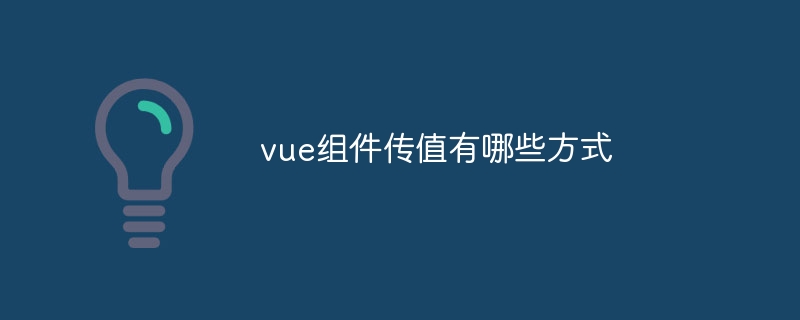In Vue development, communication between components is a very important part. Passing data allows components to work better together and improves the reusability and composability of code between components. In the process of transferring values between components, due to the very flexible nature of Vue, there are many ways to transfer data between components.
This article will introduce the common component value transfer methods in Vue, and demonstrate their usage through an example.
- Props property value transfer
In Vue, parent components can pass data downward to child components through props. The child component receives the value passed by the parent component by setting the props option. Props can be any type of value, including primitive types, objects, or arrays.
First, we create a parent component, named parent.vue, the code is as follows:
<template>
<div>
<h2 id="父组件">父组件</h2>
<p>我是父组件的信息:{{parentInfo}}</p>
<child :childInfo="parentInfo"></child>
</div>
</template>
<script>
import Child from './child.vue'
export default {
name: 'Parent',
components: {
Child
},
data() {
return {
parentInfo: '我是来自父组件的信息'
}
}
}
</script>Then we create a child component, the content of the child component is:
<template>
<div>
<h2 id="子组件">子组件</h2>
<p>我是子组件的信息: {{childInfo}}</p>
</div>
</template>
<script>
export default {
name: 'Child',
props: ['childInfo']
}
</script>In the parent component, we pass data by passing the parent component's information to the childInfo attribute of the child component. In the parent component, I use the data of the parent component to render my own information and also pass it to the child component.
In the child component, we use the props option to receive data from the parent component. Child components render their own information by using childInfo, and the childInfo value comes from the parent component.
In the above code, we use props to pass data, and use props in child components to receive data. Communication between components in this way enables data sharing between components, and the data status between components can be managed in a single way.
- $emit and $on methods pass values
In Vue, we can also use the emit method and on method for component communication. The emit method is used to send messages, and the on method is used to receive messages. This method is usually used between components that are not parent-child relationships.
First, we create a vue instance, named event.vue, the code is as follows:
<template>
<div>
<h2 id="组件间事件通信示例">组件间事件通信示例</h2>
<child></child>
<grand-child></grand-child>
</div>
</template>
<script>
import Vue from 'vue'
import Child from './child.vue'
import GrandChild from './grandChild.vue'
export default {
name: 'Event',
components: {
Child,
GrandChild
},
created() {
//使用$on监听来自子组件的事件
this.$on('sendMsg', function(message) {
console.log('父组件接收到来自子组件的消息:' + message)
})
}
}
</script>We listen for the arrival of events through the $on method in the parent component, and after receiving Print a message after the event. The specific use is implemented in the created declaration cycle hook function.
Then, let’s look at the code implementation of the subcomponent:
<template>
<div>
<h3 id="子组件">子组件</h3>
<button @click="handleClick">发送消息</button>
</div>
</template>
<script>
export default {
name: 'Child',
methods: {
handleClick() {
//使用$emit发送事件
this.$emit('sendMsg', '我是来自子组件的信息')
}
}
}
</script>In this way, when the button is clicked in the subcomponent, the $emit method will be triggered and the event name "sendMsg" will be used to send the parent The component sends the message "I am a message from the child component", and the parent component can listen to the arrival of the event through the $on method and complete the corresponding operation.
Similarly, we can also implement communication between any two components that are not parent-child relationships. This method makes the component's triggering events and listening events loosely coupled. By using the emit and on methods, more flexible component communication can be achieved.
To sum up, communication between components is also a very important part of Vue development. Proficiency in various value-passing methods is the basis for component writing. Through specific code examples, this article introduces two common value-passing methods in Vue: props value-passing and $emit/$on value-passing. These methods can effectively coordinate communication between components and improve code reusability and composability.
The above is the detailed content of Analysis of component value transfer examples in Vue documents. For more information, please follow other related articles on the PHP Chinese website!
 vue组件怎么传值Jan 06, 2023 pm 05:26 PM
vue组件怎么传值Jan 06, 2023 pm 05:26 PM传值方法:1、利用props实现父传子;2、子传父,需要自定义事件,在子组件中用“this.$emit(‘事件名’)”触发,而父中用“@事件名”监听;3、兄弟间,通过公有父元素作为桥接,结合父子props传参、子父自定义事件;4、用路由传值;5、用$ref传值;6、用依赖注入传给后代子孙曾孙;7、利用$attrs;8、借助$listeners中间事件;9、用$parent传等。
 vue组件传值的方式Jul 18, 2023 am 09:27 AM
vue组件传值的方式Jul 18, 2023 am 09:27 AMvue组件传值的方式:1、父传子;2、子传父;3、兄弟传值;4、问号传值,冒号传值和父子组件传值;5、使用“$ref”传值;6、使用“inject”给当前实例注入父组件的数据;7、祖传孙;8、孙传祖;9、$parent;10、sessionStorage传值;11、vuex。
 vue组件传值有哪些方式Jun 19, 2023 pm 03:23 PM
vue组件传值有哪些方式Jun 19, 2023 pm 03:23 PMvue组件传值的方式:1、父传子,子组件中定义“props”来接收;2、子传父,子组件中用“$emit()”触发;3、兄弟传值,定义事件总线“eventBus”;4、问号传值,冒号传值和父子组件传值;5、使用“$ref”传值;6、使用“inject”给当前实例注入父组件的数据;7、祖传孙;8、孙传祖;9、$parent;10、sessionStorage传值;11、vuex。
 Vue文档中的组件父子传值函数实现方法Jun 20, 2023 am 11:12 AM
Vue文档中的组件父子传值函数实现方法Jun 20, 2023 am 11:12 AMVue是一门流行的JavaScript框架,它的组件化开发能够帮助我们在开发复杂应用时提高模块化程度,提高代码的可维护性和可拓展性。在Vue中,组件之间的数据传递是非常常见的需求,其中最常见的场景就是父子组件之间的数据传递。为了在Vue中实现这种数据传递,我们需要理解父子组件之间传值的实现方法。在Vue的组件中,一个父组件可以同时拥有多个子组件,父组件可以向
 vue组件传值有什么方式Jul 18, 2023 am 09:32 AM
vue组件传值有什么方式Jul 18, 2023 am 09:32 AM组件传值方式:1、通过路由进行传值;2、通过在父组件中让子组件标签绑定父组件的数据,子组件的props接收父组件穿过来的值,子组件的props接收父组件传的值;3、子组件向父组件传值,用“this.$emit”来遍历getData事件;4、非父组件之间传值,一个绑定“this.on”事件,一个触发“this.$ emit”事件,或者在本地存储中添加公共数据,可以在两个页面中获取
 如何使用Vue实现组件通讯?Jul 17, 2023 pm 11:25 PM
如何使用Vue实现组件通讯?Jul 17, 2023 pm 11:25 PM如何使用Vue实现组件通讯?Vue是一种流行的JavaScript框架,用于构建用户界面。在Vue中,组件是构建网页应用程序的基本单元。而组件之间的通讯对于构建复杂的应用程序至关重要。本文将介绍如何使用Vue实现组件之间的通讯,并且提供一些代码示例。一、父组件向子组件通讯父组件向子组件通讯是最常见的一种场景。Vue提供了props属性来实现这种通讯。在父组件
 Vue文档中的组件传值举例分析Jun 20, 2023 pm 08:26 PM
Vue文档中的组件传值举例分析Jun 20, 2023 pm 08:26 PM在Vue开发中,组件之间的通信是非常重要的一部分。传递数据可以使组件间更好地协同工作,提高了组件间代码的可复用性和组合性。而在组件之间传值的过程中,由于Vue非常灵活的特性,有很多的方法可以实现组件之间的数据传递。本文将介绍Vue中常见的组件传值方式,并通过一个实例来演示它们的用法。props属性传值在Vue中,父组件可以通过props向下传递数据给子组件。


Hot AI Tools

Undresser.AI Undress
AI-powered app for creating realistic nude photos

AI Clothes Remover
Online AI tool for removing clothes from photos.

Undress AI Tool
Undress images for free

Clothoff.io
AI clothes remover

AI Hentai Generator
Generate AI Hentai for free.

Hot Article

Hot Tools

Atom editor mac version download
The most popular open source editor

Notepad++7.3.1
Easy-to-use and free code editor

SAP NetWeaver Server Adapter for Eclipse
Integrate Eclipse with SAP NetWeaver application server.

VSCode Windows 64-bit Download
A free and powerful IDE editor launched by Microsoft

Safe Exam Browser
Safe Exam Browser is a secure browser environment for taking online exams securely. This software turns any computer into a secure workstation. It controls access to any utility and prevents students from using unauthorized resources.







